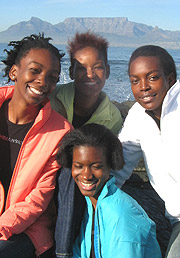
Coming up this Sunday evening (23 July) on M-Net’s Open Time at 17h00 is the first episode of the four part
Nokia Face Of Africa model search.
The search for glam faces and bodies started across 12 African countries in February when an open casting call for chickaroonies between the ages of 17 and 24 gathered leggy hopefuls to auditions.
The auditions narrowed down contestants to 17 semi-finalists who then embarked on two nail-breaking boot-camps to narrow them down to 10.
The first happened two weeks ago in Gabarone, Botswana where contestants were put throught their paces and trained in fitness, health, walking the catwalk and posing.
At the end of the week five contestants were eliminated and sent home before everyone headed down to Cape Town for last weeks Fashion Week.
The 12 semi-finalists all went on supermodel Go-See casting calls to model for the various fashion houses whose outfits needed to be strutted on the catwalk, for every booking a contestant got they received a point and the two with the least points at the end of the week were sent home.
With Fashion Week over the 10 finalists took a weeks breather spending time hotfooting it round Cape Town and gettting into adventures. This past Wednesday they went on a visit to Robben Island and invited me to go along with them as they all – except one - experienced the island for the first time.
The weather was crisply, sunnily inviting as we left by Ferry at 9am and the sea was luckily not too choppy as we sailed the route that represents the ultimate in the struggle for freedom.
As we moved through the tour of both the island and the prison we were all silent as we relived the realities of every oppressive injustice that happened and as we travelled back across the sea that had gotten choppier in between we all sat quietly, not saying very much of anything, before resting back in the chairs and dozing off.
Once we reached the Waterfront everyone got a zing in their step as we headed off to a restaurant to chow down for sustenance where I had a chinwag with each of the sweet ten – ‘cos they are. I've always thought all schmodels arecattily aloof and unfriendly but not one of them are. Here’s what they had to chitter about the trip:
Kea (Botswana):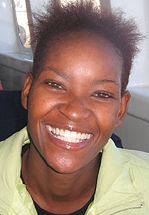 Tashi:
Tashi: Was Robben Island as you imagined it would be?
Kea: No, no it’s way too beautiful to be a prison. It’s more of a museum now and not a prison. Everything’s so green. I pictured the buildings would be torn – more old. Everything’s as if it was built three years ago. I loved everything about it.
Tashi: If you were to meet Nelson Mandela now that you’ve visited it – what would you want to ask him?
Kea: What was it like? Was he tortured as our guide said he’d been tortured? What was it like to sleep on a blanket only? How did he feel when he went out there?
Mulenga (Zambia):
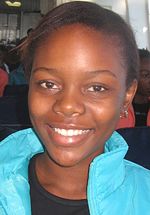 Tashi:
Tashi: Was the whole experience as you imagined it would be?
Mulenga: I’ve been to Robben Island before but it seemed different in a way ‘cos then I was younger and much of the stuff didn’t make as much sense as it did today.
It was wonderful but also very sad to know about the pressures everyone went through. Being treated like you’re not a human being is really sad.
Tashi: If you were to meet Nelson Mandela what would you ask him?
Mulenga: I don’t know if I’d really have a question for him - what I know I’d do is just sit and admire him ‘cos of what he’s been through. 27 years in prison sounds like a lifetime to me.
How did he have hope that he’d have life afterwards? – a life as he’s living right now. You spend so much time in prison, you’re not allowed to see your family and stuff like that – I, personally, I’d forget about everything. I think I’d have given up while in prison but he still had the will to live life – I’d ask him how he did that.
Venantia (Namibia):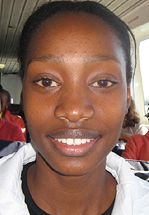 Tashi:
Tashi: Have you been to Robben Island before?
Venentia: No, I’ve seen it on television but being here yourself and seeing it up close, it’s even more great than on TV.
Tashi: Now that you’ve been what would you ask Nelson Mandela if you met him?
Venantia: I would ask him how he coped with being in prison and all those years of wasting – without being in life and socialising and meeting new people.
Ishioma (Nigeria):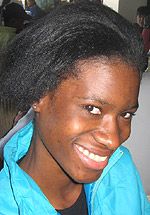 Tashi:
Tashi: Was Robben Island as you imagined?
Ishioma: No ‘cos I thought it would be small but it was so big and spaceous. The outside - not for them though. It was such a long time ago.
Tashi: Does it feel like a long time ago to you?
Ishioma: Yes, the dates and stuff like that – I wasn’t born then.
Tashi: If you were to meet Nelson Mandela, what would you ask him?
Ishioma: I’d ask him where he gets his inspiration from. Like how does he come about things like – you’re in prison and you’re suffering and you want a garden. Where does all that come from?
Catherine (Ghana): Tashi:
Tashi: If you were to meet Nelson Mandela now, what would you ask him?
Catherine: How did he feel being there and what would he want to teach me? I think he’d have learnt more in life – what life is like on the other side. He hasn’t just experienced life on the better side – he could tell me what to do when there’s a bitter side of life.
Mirash (Ghana):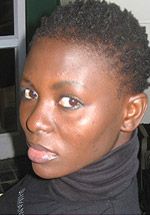 Tashi:
Tashi: Was Robben Island as you thought it was gonna be?
Mirash: When they were talking about Robben Island I didn’t know exactly what it was – all I knew was we were going to see a prison of Nelson Mandela and all that but when I got there and heard the stories of the place and got to know how people were treated, I was really sad. I didn’t know the stories as I got to know them today. I didn’t know how people really suffered there.
Tashi: If you were to meet Nelson Mandela what would you ask?
Mirash: How he was so brave when he was in prison. Our guide kept saying “Nelson Mandela did this ...Nelson Mandela did that ...Nelson Mandela walked into the warden's offices and said ’This has to be done’”. I’d like to ask how he was so brave to have done that.
Andenyi (Kenya):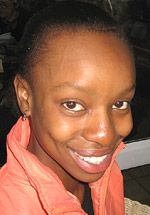 Tashi:
Tashi: Did you have a picture in your mind as to what Robben Island would look like?
Andyeni: Ja, I expected it to just be this island in the middle of the waters and old walls and buildings that are almost falling down. Older. When I got there it was different – it looked as if it had just been built.
I did it in my History class so I had this picure in my mind – hearing about everybody being put through torture – it looked different from how I imagined. Hearing what our guide had to say about being in jail – it made me feel worse than I felt reading it though. He’s talking and you could see where it happened – we were right in the history.
Tashi: If you could meet Nelson Mandela – what would you ask?
Andyeni: What kept him going. Honestly, if it was me I’d have been there for the first and second day and by the third day I would have died out of hopelessness. I’d ask him to speak to people and encourage them – to show them that there’s something out there, that there’s always something that will happen differently – that the day is not always going to be black.
Sandra (Burundi):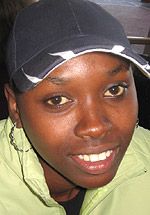 Tashi:
Tashi: What would you ask Nelson Mandela if you met him now?
Sandra: I’d ask him why he didn’t get sick. It’s so difficult to live in prison like he did and also - how did his family cope?
*Sandra only speaks French but answered in English.
Munira (Uganda):
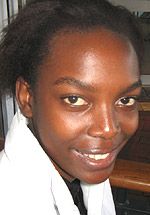 Tashi:
Tashi: Did you have any idea about what Robben Island would be like?
Munira: What I thought was totally different from what I saw. I thought it was just gonna be like a normal prison but it was so big. I thought it was going to be one big building.
Tashi: If you were to meet Nelson Mandela – what would you ask him?
Munira: I’d like to ask if, right now, when he goes to visit the prison – what he really feels.
Tashi: What do you think he might feel?
Munira: I think it must make him feel desperate – thinking of all the things he went through and all the things that happened – must make him feel desperate, but I’d like to know from him what he feels.
Melody (South Africa):
 Tashi:
Tashi: Before we went you said seeing the island from a distance wasn’t what you expected. That it was much bigger and newer with more buildings than you expected. Did this feeling carry through on it too?
Melody: No – when we got off the boat, just the pictures on the wall, it had a very eerie feeling. The pictures just told their own story and when we drove around, it just gave me everything I wanted to hear and wanted to know. Documentaries only tell you so much but we got a chance to be on the island for two hours and got to know stuff I didn’t even know.
Tashi: Like what?
Melody: About the torturings – it was an eye-opener and when our guide Thulani was speaking and saying all the things that had been done to him and his family and co-accused – it was like a forgive-and-forget type of thing and it’s so hard to be somebody like that.
To think that he’s been through so,so much and he can still forgive and forget. What I loved about it was that our guide has actually been through it so it painted a picture in your head and you could imagine everything. It was extremely heartbreaking. It made me do a lot of soul-searching in terms of holding grudges, always being angry when there’s so much more to do. Keeping feelings inside instead of just letting them go.
Tashi: If you were to meet Nelson Mandela now that you’ve been what would you want to ask?
Melody: What exactly was going through his mind when he set the whole ANC to take over South Africa. How he planned it ‘cos I can’t even imagine it myself. For people to be going through something so harsh and so violent and still be able to be so positive and strong. What was the force behind the attitude of what they were wanting to achieve?
EndsYou can catch everyone starting their ramp to the Top 10 from Sunday and in four weeks time they'll battle it out for the win when one of them will be chosen as the Face of Africa in Sun City Finale showdown.